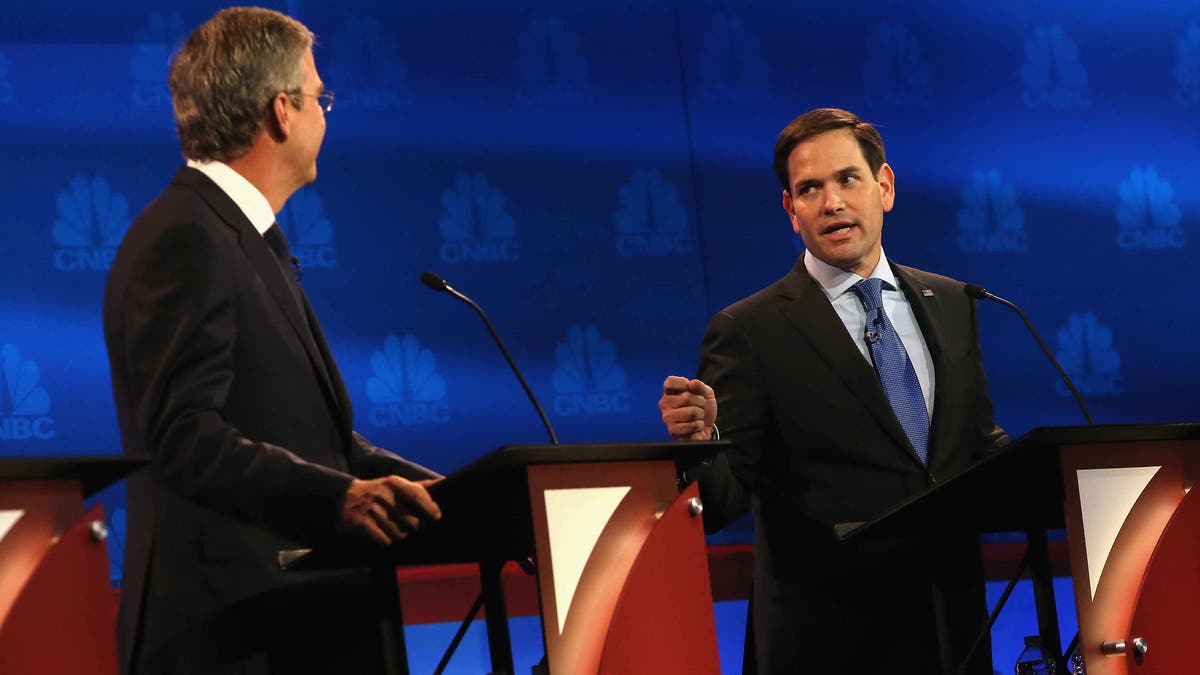
BOULDER, CO - OCTOBER 28: Presidential candidates Sen. Marco Rubio (R) (R-FL) speaks while Jeb Bush looks on during the CNBC Republican Presidential Debate at University of Colorados Coors Events Center October 28, 2015 in Boulder, Colorado. Fourteen Republican presidential candidates are participating in the third set of Republican presidential debates. (Photo by Justin Sullivan/Getty Images) (2015 Getty Images)
Just weeks ago, it did not seem that Marco Rubio needed to lose any sleep over Jeb Bush.
After all, Rubio was seen as the darling presidential candidate of the GOP establishment because of a string of impressive debate performances and a strong Iowa caucus showing.
But after a disastrous GOP debate where Chris Christie essentially left the normally cool and eloquent Rubio stammering, followed by a fifth-place finish in the New Hampshire primary, the South Carolina vote on Saturday has become critical for the Florida lawmaker.
He must persuade people who had been ready to ditch Bush for Rubio after New Hampshire, but who got jittery after he did worse than expected, that he has recovered and is the best non-extreme Republican option for the nomination, according to the New York Times.
A Rubio supporter said the senator entered the ill-fated debate with indications from Bush backers that they would be ready to switch loyalty after the New Hampshire primary, which had been expected to seal Rubio as the best bet for the GOP establishment.
But after Christie successfully repeatedly attacked Rubio in the debate, the supporter told the Times, “those calls stopped.” Another unidentified supporter added: “Totally frozen.”
Friends, advisers and backers of Rubio says if he should finish behind Bush, it would spell real trouble for the junior senator, according to the Times.
To be sure, thus far South Carolina voter polls indicate that Donald Trump will win, perhaps with a double-digit margin over whoever comes in second place.
Rubio’s campaign has taken the blame for the fallout after the debate that hurt their candidate, saying they had made a tactical error in advising him not to hit back hard at Christie because it wouldn’t pay off.
A weaker-than-expected showing by Sen. Ted Cruz, who is pursuing conservative and evangelical voters, is seen as a potential boost to Rubio, a one-time Tea Party favorite who could pick up anti-Trump conservatives, many experts say.
Basically, many believe Rubio cannot come in lower than third, certainly not behind Bush, who doggedly has been trying to wear the establishment mantle and at the start of the election cycle seemed like the inevitable moderate GOP front-runner.
All told, the stakes are high in South Carolina, where about a third of voters remain undecided.
“When you see what happens in South Carolina,” Tim Scott, a Republican senator in South Carolina told the Times, “it will carry momentum into Nevada, and then into Super Tuesday.”
Like us on Facebook











































